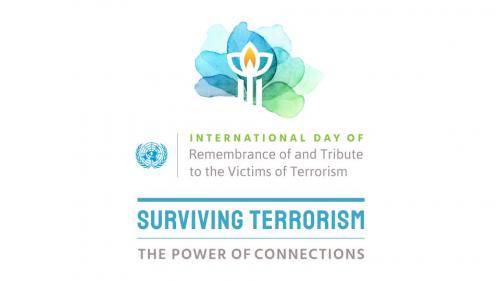
I am pleased to join you for the fourth International Day of Remembrance of and Tribute to the Victims of Terrorism.
On this day, we remember and honour the individuals, families, communities and societies that have been traumatized by terrorist acts.
This year we focus on “connections” and their importance to victims – especially in the current pandemic environment.
Next month marks 20 years since terrorists attacked the Pentagon in Washington, crashed a plane in Pennsylvania and destroyed the World Trade Center towers here in New York.
Nearly 3,000 people were murdered, and thousands more injured or made sick by the debris.
The attack was met with horror and revulsion worldwide.
Since then, we have seen terrorism take new and previously unthinkable forms, killing and maiming many thousands more around the world, destroying families and upending societies.
Violent religious and political extremism, xenophobia and racism have further added to the toll.
Now we have the COVID-19 pandemic, restricting movements and limiting our ability to see loved ones.
For many victims, this has exacerbated feelings of isolation and deprived them of essential resources needed for rehabilitation.
Today we say to all victims and survivors of terrorism: you are not alone.
We recognize your pain and the invaluable benefits of support, care, and connection for your mental and physical health and well-being.
The collective work of Member States, including through the United Nations, civil society, victims’ associations, and victims themselves, is helping to better provide connections, uphold the rights and support the needs of victims of terrorism.
This imperative is emphasized by the General Assembly’s seventh review resolution of the Global Counter-Terrorism Strategy, where Member States deeply deplored the suffering caused by terrorism to the victims and their families.
The resolution further encouraged Member States to provide victims with proper support and assistance, particularly those who are also victims of sexual and gender-based violence.
National legislation and comprehensive assistance plans are urgently needed to address short- and long-term needs of victims of terrorism and their families.
I thank the Group of Friends of Victims of Terrorism for their leadership on this important issue.
The United Nations will continue to support Member States’ efforts to address the needs of victims of terrorism.
I look forward to learning how we can advance these efforts, and to hearing directly from victims about their needs and challenges, during the first-ever Global Congress of Victims of Terrorism, which we still intend to hold at the United Nations in 2022.
Excellencies,
Ladies and gentlemen,
Remembrance means honouring those who have lost their lives.
It also means looking forward and understanding our responsibility to prevent more deaths.
This is why the United Nations is committed to preventing terrorism, including by addressing conditions conducive to the spread of terrorism and supporting efforts to hold terrorists accountable for the suffering they have caused.
On this International Day, let us stand with the victims of terrorism.
Let us listen to those who so often feel unheard.
Let us act every day to uphold their rights.
And let us ensure that we do everything we can to prevent more victims of terrorism.
Thank you.










Add new comment